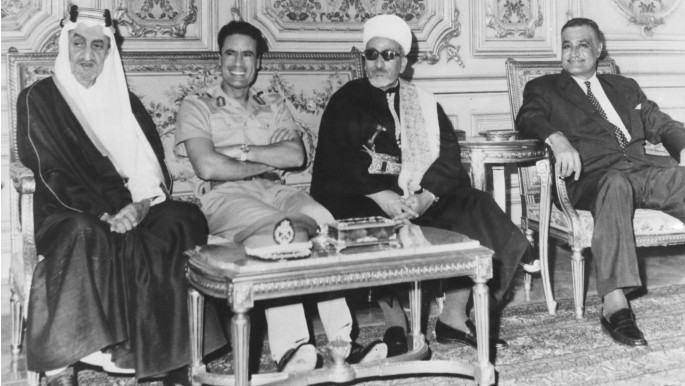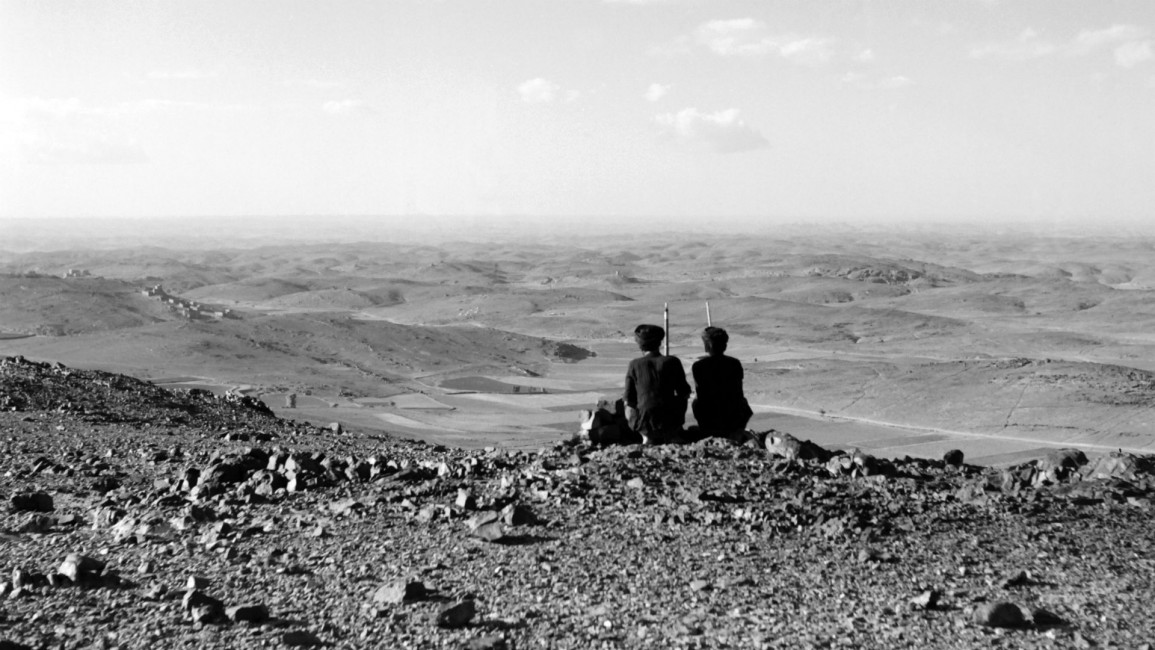
Power and war in Saudi Arabia's backyard
Just after the international envoy to Yemen, Jamal Benomar, left Sanaa for Saudi Arabia, the Houthis issued their constitutional declaration that dissolved the country's government.
The goal of Benomar's visit was reportedly to seek help from Gulf powerhouse Saudi Arabia before the Houthis turned the tables by stealth. But before the envoy even reached Riyadh, any hope of resolving Yemen's month-long crisis was over.
Gulf initiative
The event also marked an end to the fragile Gulf Initiative, brokered by the UN and Saudi Arabia in 2011 to oversee a transition of power in Yemen from Saleh to a democratically elected civilian power.
Saudi Arabia, a country that has a long history of political influence in Yemen since at least the 1930s, had finally lost its hold over the country.
Yemen has been described as Saudi Arabia's back garden - and in recent history, Riyadh has been a key player in Sanaa's domestic politics.
Riyadh showed its influence in two of Yemen's defining moments in recent years. First was its role in the 1978 rise to power of Ali Abdullah Saleh, and the second in the reunification of South and North Yemen in 1990.
It is no secret that the key to Saleh's rise to power in North Yemen was after the intervention of Saudi Arabia. There is a famous account of tribal leader Sheikh Abdullah bin Hussein al-Ahmar taking Saleh to Riyadh after the assassination of former president Ahmed Hussein al-Ghashmi.
In Riyadh, Saleh met key Saudi officials and the kingdom agreed to back the military governor and provide Saleh with financial support.
Relations between Saudi Arabia and Saleh only soured after the Iraqi invasion of Kuwait, when the Yemeni president threw in his lot with former Iraqi dictator Saddam Hussein.
In response, the Saudis and other Gulf states expelled around a million Yemeni migrant workers and backed the south during the 1994 civil war. But Saleh continued to remain indebted to Riyadh and the relationship remained close.
Joint partnership
Saudi Arabia helped Sanaa and Aden achieve reunification - although it had the power to block the formation of a united Yemen.
For his part, Ali Abdullah Saleh promised the late King Fahd to demarcate borders between their two countries. This would eventually come to pass in the Jeddah Treaty, signed in June 2000, where Saudi Arabia was given concessions to disputed territories near the Empty Quarter.
Due to Saudi Arabia's historical role in its neighbour's affairs, border overlaps, and the millions of Yemenis who have worked in Saudi Arabia, for many years Yemen was close to the top of Riyadh's priorities.
Saudi Arabia was unique in having its own "special committee" for Yemen, under the supervision of former Defence Minister Sultan bin Abdul Aziz. The prince handled almost all issues related to Yemen from the early 1960s until his death in October 2011.
Saleh's key ally, the tribal leader Ahmar, was also indebted to the support received from Saudi Arabia.
His transformation from local sheikh to political leader grew with the establishment of al-Islah Party, which Riyadh backed. This was effectively an alliance between the Muslim Brotherhood, Ahmar and tribes under the rule of Sheikh Abdul-Majid al-Zindani.
Following the sheikh's death, his clan was left in a much weaker position, and so was Riyadh inside Yemen. Ahmar's son, Sadeq, was unable to fill his father's shoes - either in the tribal confederation or inside the Islah Party - and he could rarely rally the support of his extended family.
Tribal politics
Sadeq's brother, Hamid, clashed with Saleh when his own ambitions to become president became clear. The rift continued - and, in the end, the Ahmar clan sided with the revolutionaries in 2011, who eventually pushed Saleh from the palace.
| Relations between Saudi Arabia and Saleh only soured following the Iraqi invasion of Kuwait. |
The animosity between the two sides never healed.
It has been said that, since Saleh left power, he has been waiting for an opportunity to take revenge on the Ahmar clan.
This might explain why Saleh may have been motivated to work with the Houthis during their power grab; the Zaydi movement has also sought to end the dominance of the Ahmar clan and Islah.
Another event that hit Saudi Arabia's influence in Yemen was the merger of two al-Qaeda branches in 2009. The threat posed by al-Qaeda in the Arabian Peninsula [AQAP] to al-Saud rule forced Riyadh to shift their priorities in Yemen towards security rather than power games.
This policy became increasingly pronounced when militants attempted to assasinate Saudi Arabia's now interior minister, Mohammed bin Nayef, in 2010.
The fact that AQAP found refuge in remote areas of Yemen, and the swelling number of Saudis fighting in its ranks further bolstered Riyadh's "security first" approach to Yemen.
When Sultan bin Abdul Aziz died in 2011, Saudi policy on Yemen was placed in the hands of Nayef bin Abdul Aziz. Nayef lacked his predecessor's knowledge of Yemen, and Saudi Arabia's influence in its southern neighbour began to decline.
Financial support from Riyadh to selected tribes, politicians, and media figures in Yemen began to dry up under the austerity drive of King Abdullah. There was a price to pay as Saudi Arabia lost its "Saudi lobby" in Yemen, which yielded enormous influence in the country.
Finally, when Riyadh's special committee for Yemen was dissolved by the king in 2013 it marked the end of an historic relationship.
Now Riyadh's policy was in the hands of four men - Foreign Minister Saud al-Faisal, Interior Minister Mohammed Nayef, National Security Council chief Bandar bin Sultan, and the secretary general for the tourism authority, Sultan bin Salman.
Houthi takeover
This new body is ineffective, and could not keep up with the fast-paced developments in Yemen these past few months. When Yemen's balance of power shifted to the Houthis, Saudia Arabia was powerless to stop their Zaydi rivals.
Even security cooperation between Riyadh and Sanaa effectively ended because Yemen's security services were loyal to Saleh.
Riyadh's sponsorship of the Gulf Initiative in 2011 saw Saleh removed from power, despite the fact that he was one of Saudi Arabia's most trusted and longest serving allies.
Saudi Arabia's impulsive action lost the Gulf state its most reliable partner in Yemen, who Riyadh had invested in since the 1970s.
 |
|
| Saudi used its oil money to support allies in Yemen [AFP] |
Saleh was a fait accompli for Saudi Arabia, and was supported militarily, economically, and politically.
In fact, even before Houthi tribesmen entered Sanaa, Riyadh supposedly kept the door open to Saleh.
The souring relationship came to an end when Riyadh refused to receive Saleh, who wanted to offer his respects after the death of King Abdullah.
Saleh departs
After Saleh's departure from power, Riyadh wagered on his deputy, Abed Rabbuh Mansour Hadi, who became president in 2011. In Riyadh's calculus, Hadi and his allies in the Ahmar clan - along with Major General Ali Mohsen al-Ahmar - were a strong enough team to continue influencing decision making in the country.
As the Houthis scored a number of political and military victories, Saudi was left out in the cold.
The Ahmar clan were defeated by the Houthis in Amran, before Major General Ali Mohsen al-Ahmar was forced to flee Sanaa for Riyadh. Finally, Hadi stepped down as president.
Hadi is reportedly under house arrest in Sanaa, and the Houthis have allegedly prevented him from leaving the country for medical treatment.
With this cataclysmic shift, Yemeni sources say the Saudis are still insisting on Hadi being reinstated as president.
Meanwhile, the Houthis have already started deliberations over who should head the five-member presidential council that will run Yemen.
It is rumoured that Benomar has suggested the former president of South Yemen, Ali Nasser Mohammad, as a possible successor to Hadi.
However, the Houthis look more inclined to nominate former defence minister Major General Mahmoud al-Subaihi, recently appointed as head of the Security Committee.
Subaihi hails from the south, where he is a respected figure.
For the first time in modern history, Saudi Arabia has little ability to intervene in Yemen. While the Houthis clamp down on opposition, Riyadh has no direct allies who can influence events. The same applies for the rest of the neighbouring Gulf countries save perhaps for Oman, where officials are on good terms with the Houthis.
In other words, the Gulf Initiative is history.
There are reports suggesting that the Houthis are gearing up to reopen cases involving former Yemeni leaders, including Ali Abdullah Saleh and President Hadi's son, Jalal.
These cases have to do with large financial grants Yemen received as foreign aid, which were never deposited in the treasury. Instead, it is alleged that the money found its way to the private accounts of a number of senior officials who were until recently in power.
The Houthis may want to gain some popularity through anti-corruption drives, particularly as Yemen remains stunted by mass poverty.
However, it is said that the Houthis are extending an olive branch to Saudi Arabia, reassuring them about the border with the kingdom, in the Houthi heartland, Saada province.
This has been the scene of fighting between Saudi Arabia and Zaydi fighters in recent years.
Many Yemeni sources believe these pledges are temporary, and could evaporate in light of the regional and international polarisation over Yemen.
Yemen is at a crossroads, and Saudi Arabia could lose its historic position as the key international player in the country.
This article is an edited translation from our Arabic edition.
Opinions expressed in this article remain those of the author and do not necessarily reflect those of al-Araby al-Jadeed, its editorial board or staff.




